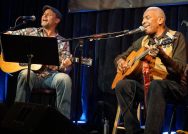
Serving Veterans
Serving Veterans
An interview with Cappy Hill ’76

In the coming years, Williams is committed to building a sustainable program to enroll a dozen or so veteran, transfer and other nontraditional students in each entering class as part of its broader work to increase access and affordability for all. Expanding the cohort across all classes from around 25 each year to 40 or 50, and helping them to thrive once they’re here, involves adjusting, expanding and in some cases creating recruitment, financial aid, housing and support services—work that is already well underway.
An important aspect of the college’s approach is strengthening partnerships with organizations such as the Warrior-Scholar Project (WSP), whose mission includes empowering veterans to excel at higher education via immersive academic boot camps in partnership with some of the nation’s top universities. Williams has hosted these boot camps, which feature faculty lectures, workshops and research projects, each summer since 2020.
In September, WSP announced that Cappy Hill ’76, Williams’ former provost and professor of economics, joined its board. An expert on improving access to higher education, Hill was president of Vassar College and now leads research and advising initiatives to expand accessibility as the managing director of Ithaka S+R. She discusses with Williams Magazine her continuing work to increase the representation of enlisted veterans at selective colleges and universities like Williams.
Why did you join the board of the Warrior-Scholar Project?
WSP is proving effective at providing enlisted veterans with the skills and confidence needed to succeed in college. The military offers some, but only limited, guidance to veterans who want to earn a degree after transitioning from the military to civilian life. WSP helps them make better decisions about their higher education choices and increases the likelihood that they will use the GI Bill benefits they have earned to attain a degree. By joining the board, I hope to support WSP as it finds ways to scale its impact.
As of 2021, 5.1 million veterans were eligible for post-9/11 educational benefits. Yet 68% of them have not attained a B.A. They are half as likely to enroll in institutions with a graduation rate greater than 70%. Underrepresented minorities are overrepresented in the enlisted military, and a large share of enlisted student-veterans are first-generation college students. As a society, if we are to improve post-secondary educational attainment—important both for individual welfare as well as for economic growth and national competitiveness—these are the populations who need attention.
What impact can veterans have on campus, particularly at a liberal arts college like Williams?
Veteran, transfer and nontraditional students “have a disproportionate positive impact in academics, student leadership and life outside the classroom.” —from the Williams College Strategic Plan
Enlisted veterans bring very different life experiences to campus, from which the whole community can learn both inside and outside the classroom. But I don’t think this is the primary reason for recruiting veterans. Instead, it is the opportunity offered to the veterans themselves. Colleges and universities with the highest graduation rates offer superb educational and extracurricular opportunities, and enlisted veterans deserve access to these programs given their service to our country.
What makes Williams and WSP partner schools a good fit?
Partner schools offer fantastic educations to their students. Veterans in many cases weren’t ready for higher education when they enlisted, but after serving and leaving the military, they are focused and disciplined, and they want to go on and to attain a degree. WSP partner schools make it more likely that they will do so. Their high graduation rates come from great faculty, many small classes, lots of advising, rich extracurricular opportunities and a variety of support services. Faculty who participate in WSP boot camps on campus become some of the strongest supporters of both the program and matriculating veterans to the college.
What challenges do veterans face as students, and what are colleges like Williams doing to make them feel a part of the campus community?
Veterans are older than most students at selective colleges and universities. Having a critical mass of veterans can be useful so that they can support each other. Having dedicated space where they can study and socialize, and a dedicated person in the student dean’s office, have proved useful. But, most importantly, encouraging veterans to take advantage of all the opportunities colleges and universities have to offer can make a big difference. Participating in the classroom is straightforward. Extracurricular opportunities can have a large impact and give them an effective way to get to know a set of more traditional-age students with similar interests.
WSP also addresses the challenges that veterans may face by showing them that they can, in fact, do the work and by introducing them to these college and university campuses, which may feel very unfamiliar at first. Programs like the academic boot camp are beneficial. President [Maud] Mandel taught in the program offered at Williams this past summer—a wonderful way to demonstrate support.
To view more information for veteran, transfer and nontraditional applicants, visit the Office of Admission webpage. Or, contact Alex DiAddezio, senior assistant director of admission, at [email protected] or Tamanika T. Steward, associate dean for sophomore year students and director of transfer and non-traditional students services, at tts1@williams.edu.
Above: Jordan Wynn ’26 (center) transferred to Williams from Howard Community College in Columbia, Md., after nine years in the Navy.










Megamenu Social